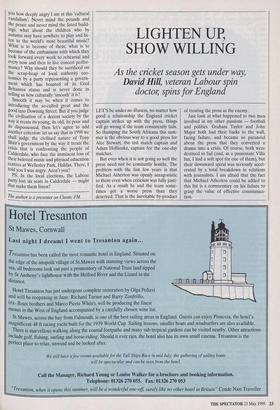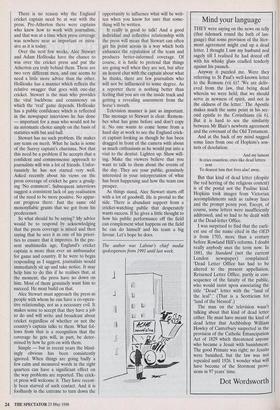LIGHTEN UP, SHOW WILLING
As the cricket season gets under way, David Hill, veteran Labour spin
doctor, spins for England
LET'S be under no illusion, no matter how good a relationship the England cricket captain strikes up with the press, things will go wrong if the team consistently fails. So thumping the South Africans this sum- mer is the obvious way to a good press for Alec Stewart, the test match captain and Adam Hollioake, captain for the one-day matches.
But even when it is not going so well the press need not be constantly hostile. The problem with the last few years is that Michael Atherton was openly antagonistic to them even when criticism was fully justi- fied. As a result he and the team some- times got a worse press than they deserved. That is the inevitable by-product of treating the press as the enemy.
Just look at what happened to two men involved in my other passions — football and politics. Graham Taylor and John Major both had their backs to the wall, facing failure, and became so paranoid about the press that they converted a drama into a crisis. Of course, both were destined to fail (and, as a passionate Villa fan, I had a soft spot for one of them), but their downward spiral was seriously accel- erated by a total breakdown in relations with journalists. I am afraid that the fact that Michael Atherton could be added to this list is a commentary on his failure to grasp the value of effective communica- tion. There is no reason why the England cricket captain need be at war with the press. Pre-Atherton there were captains who knew how to work with journalists, and that was at a time when press coverage Was nowhere near as important or intru- sive as it is today.
Over the next few weeks, Alec Stewart and Adam Hollioake have the chance to win over the cricket press and put the Atherton era truly behind them. These are two very different men, and one seems to need a little more advice than the other. Hollioake has a manner which reflects the relative swagger that goes with one-day cricket. Stewart is the man who provides the vital backbone and consistency on which the 'real' game depends. Hollioake has a public confidence which is reflected in the newspaper interviews he has done — important for a man who would not be an automatic choice simply on the basis of statistics with bat and ball.
Stewart has no such problem. He makes any team on merit. What he lacks is some of the Surrey captain's charisma. Not that this need be a problem if he accepts that a confident and commonsense approach to journalists will win a lot of friends. Unfor- tunately he has not started very well. Asked recently about his views on the press coverage of cricket he gave a grudg- ing 'No comment'. Subsequent interviews suggest a consistent lack of any realisation of the need to be more positive. No appar- ent progress there. Just the same old monosyllabic grunts that we got from his predecessor.
So what should he be saying? My advice would be to respond by acknowledging that the press coverage is mixed and then saying that he sees it as one of his priori- ties to ensure that it improves. In the pre- sent multimedia age, England's cricket captain is more than ever an ambassador for game and country. If he were to begin responding as I suggest, journalists would immediately sit up and take notice. It may help him to do this if he realises that, at the moment, the press have no down on him. Most of them genuinely want him to succeed. He must build on that.
Alec Stewart must approach the press as people with whom he can have a co-opera- tive relationship, not as a necessary evil. It makes sense to accept that they have a job to do and will write and broadcast about cricket regardless of whether or not the country's captain talks to them. What fol- lows from that is a recognition • that the coverage he gets will, in part, be deter- mined by how he gets on with them.
Simple — but in recent years the blind- ingly obvious has been consistently ignored. When things are going badly a few calm and measured words in the right quarters can have a significant effect on the way problems are reported. The crick- et press will welcome it. They have recent- ly been starved of such contact. And it is foolhardy in the extreme to turn down the opportunity to influence what will be writ- ten when you know for sure that some- thing will be written.
It really is good to talk! And a good individual and collective relationship with the press will mean that Stewart can often get his point across in a way which both enhances the reputation of the team and produces better-informed coverage. Of course, it is futile to pretend that things are going well when they are not, but after an honest chat with the captain about what he thinks, there are few journalists who will not be influenced to some degree. As a reporter there is nothing better than feeling that you are on the inside track and getting a revealing assessment from the horse's mouth.
Television manner is just as important. The message to Stewart is clear. Remem- ber what has gone before and don't copy it. No one wants to come home from a hard day at work to see the England crick- et captain looking as though he has been dragged in front of the camera with about as much enthusiasm as he would put into a visit to the dentist. Lighten up. Show will- ing. Make the viewers believe that you want to talk to them about the events of the day. They are your public, genuinely interested in your interpretation of what has been happening and how the team can prosper.
As things stand, Alec Stewart starts off with a lot of goodwill. He is pivotal to the side. There is abundant support from a cricket-watching public that desperately wants success. If he gives a little thought to how his public performance off the field can complement what happens on the field he can do himself and his team a big favour. Let's hope he does.
The author was Labour's chief media spokesperson from 1991 until last week.



































































 Previous page
Previous page